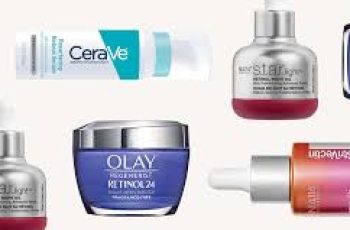What’s Your Skin Type? Take This Easy Test To Find Out
Knowing your skin type can help you learn how to take better care of your skin, develop a skincare regimen that’s right for you, and address any skin concerns you may have. Several factors, like your genetics, environment, and underlying health conditions, can influence your skin type.
Take Health’s skin type test to help you determine whether your skin is dry, oily, combination, normal, or sensitive.
The Different Skin Types
There are five different skin types:
Dry skin: Lacks hydration and has difficulty retaining moisture, which can cause rough, flaky, or itchy patches and redness1
Oily skin: Causes excess sebum (oil) production, which can lead to a shiny or greasy appearance and acne-prone skin2
Combination skin: Produces characteristics of both oily and dry skin, making some areas of your skin feel rough and other areas feel shiny3
Normal skin: Has a healthy balance of moisture and oil production, making it free of rough, greasy, and acne-prone skin3
Sensitive skin: May be prone to burning, turning red, or itching after using products or coming into contact with certain ingredients, climates, and other environmental factors4
Which Skin Type Do You Have?
If you’re interested in learning your skin type, this quiz is for you.
Another way you can test your skin type at home is by washing your face and not applying any products to it for at least 30 minutes. Then, apply blotting paper to your skin. If it stains with oil, you may have oily skin. If it does not stain, you may have normal or dry skin. If your forehead stains the paper but your cheeks don’t, you may have combination skin.5
Why Knowing Your Skin Type Is Important
With so many skincare products on the market, it can be hard to know what’s the best choice. Knowing your skin type can be helpful, as some ingredients may be better for your skin type and any skin concerns you’re experiencing. Once you identify your skin type and learn more about it, you can create a skincare routine that works well for you.
If you have oily skin, that might mean learning how to reduce and manage acne breakouts. If your skin is dry, you’ll want a regimen that keeps your skin hydrated. If you have sensitive skin, knowing what will soothe and calm your skin vs. what will irritate it can make a difference in your daily comfort.
How To Take Care of Your Skin
There are some things experts recommend you do regularly to care for your skin and keep it healthy. Here are some tips for every skin type.
Protect Your Skin From the Sun
One of the most important things you can do for skin health is to protect your skin from being exposed to the sun’s harmful ultraviolet (UV) rays. These rays cause sunburn and early signs of aging, like wrinkles and sunspots. UV rays are also a leading risk factor for skin cancer—the most common cancer in the United States.6
To keep your skin safe, the American Academy of Dermatology recommends applying a broad-spectrum (UVA- and UVB-blocking), water-resistant sunscreen with an SPF of 30 or higher and reapplying every two hours, as well as after swimming or sweating.7 Beyond this general recommendation, the type of sunscreen you use may depend on your skin type.
If you have dry skin, try a sunscreen with moisturizer or a cream sunscreen. Gel sunscreens are recommended for oily skin, and sunscreens with zinc oxide and titanium dioxide can prevent acne breakouts and may be better tolerated by people with sensitive skin.7
In addition to wearing sunscreen, consider these other sun protection tips:8
Use sunglasses and a wide-brimmed hat
Wear light and airy sun-protective clothing
Seek shade on hot days
Try a lip balm with an SPF of 30 or higher to protect your lips
Moisturize Regularly
Keeping your skin hydrated is important for all skin types, although dry and sensitive skin may need a little extra care. Lotions, ointments, and creams all trap moisture in your skin. Moisturize as soon as you wash your hands or face or after bathing to keep dry skin hydrated.9
If you have normal or oily skin, applying lotion after a bath, shower, or face washing is likely enough to keep your skin moisturized. For dry or sensitive skin, you may want an ointment or cream because these products are better at trapping moisture and less likely to irritate the skin than lotions.9
Pick the Right Products
Choosing products with the right ingredients for your skin type is key, especially if you have dry, oily, or sensitive skin. Consider these tips:39
For dry skin:
Avoid products with alcohol, fragrances, and retinoids, as these ingredients can make it harder for your skin to retain its natural oils
Choose gentle cleansing products with no fragrances
Use ointments or creams with ingredients like jojoba oil, shea butter, lactic acid, glycerin, hyaluronic acid, and lanolin to add moisture
For oily skin:
Look for oil-free or non-comedogenic products that won’t clog your pores or cause acne
Keep an eye out for oil-free or water-based makeup products if you wear cosmetics
Use a face wash with salicylic acid, as this can help remove excess oil from your pores
For sensitive skin:
Choose gentle cleansers
Avoid products with alcohol, added fragrances or dyes, and retinoids
Try ointments and creams with ingredients that help lock in moisture
Keep your routine simple with a gentle cleanser, sunscreen, and moisturizer
Everyone’s skin is a little bit different. Even if you have the same skin type, what’s right for you may not work for someone else. Try new products by testing them on a small area of the skin first to make sure you don’t experience irritation or any side effects. Talking to a dermatologist or esthetician can also help you make the right choices for your skincare regimen.
DQH Knowledge drop: In your 20s, your skin cell turnover decreases. (Cell turnover is a key component in keeping your skin youthful.) You know what else slows down? Your collagen production. Starting in your 20s, collagen decreases by about 1 percent per year. Should you want to prevent fine lines and wrinkles, start by eliminating behaviors that contribute to premature aging. “If it’s bad for you, it’s bad for your skin,” says dermatologist Michel Somenek.
“Cigarette smoking reduces blood flow to the skin and causes premature wrinkling and a dull skin texture. Making the repeated pursed motion to inhale can also cause smoker’s lines. Alcohol and recreational drugs are toxins for the skin that damage its cellular structure and DNA,” Somenek tells us. “The faster you eliminate vices while you are young, the better chance your skin and body have to recuperate.” Also, adopting an anti-aging routine in your 20s is key. After all, the best offense is a good defense. We spoke to Somenek and experts Joshua Ross and Audrey Kunin to find out more.
Keep reading for the best anti-aging products for your 20s, according to skincare professionals.
Sunscreen
“We all know that the sun is the number one cause of skin aging and starting the prevention in your 20s is very important,” Ross says. “The majority of your sun damage won’t start to appear until you’re in your 30s, so don’t wait until you see it surface or you’ll be behind the curve. Stay ahead of it with a good-quality zinc-based sunscreen worn daily.”
Farmacy Green Defense Daily Mineral Sunscreen
An invisible sunscreen with SPF 30, plus botanical extracts meant to protect skin with tons of antioxidants. Bonus: It’s clean and fine to use under makeup.
Bareminerals Complexion Rescue™ Tinted Moisturizer Broad Spectrum SPF 30
Although we recommend you use your SPF and moisturizer separately, we also understand moments when you don’t have time or energy for that extra step. For those times, this bareMinerals moisturizer is a great thing to have on hand.
Vitamin C Serum
“A great introduction to anti-aging is to start with a vitamin C serum in your morning skincare routine,” Ross says. “It’s a powerful antioxidant that will neutralize free radicals and brighten the skin.” He adds that it’s a great way to counteract the effects of the sun’s harmful rays, which, as previously mentioned, are among the biggest causes of premature aging.
Drunk Elephant C-Firma™ Vitamin C Day Serum
The Drunk Elephant C-Firma is a lightweight serum that promises to give skin a glow by combining the brightening powers of vitamin C with ferulic acid, l-ascorbic acid, and vitamin E. The included sodium hyaluronate is meant to replace hydration loss, so you shouldn’t have to deal with any irritation.
Sunday Riley C.E.O. Rapid Flash Brightening Serum
This potent serum is jam-packed with vitamin C (15 percent, to be exact), which means it’s a potential superstar at both brightening skin and dousing it in antioxidants.
Peptides
Using peptides on your skin has many benefits, says Somenek. “The skin barrier is what defends the body against pollution, UV rays, bacteria, and toxins. It can be damaged by several everyday factors. Using topical peptides aids in building a stronger barrier,” he says. “Peptides comprise elastic fibers, which are a type of protein. These fibers help to make skin appear taut and firm. Peptides can also help repair damaged skin, relieve inflammation, and even out skin tone. Some peptides can kill acne-causing bacteria that is common in 20-somethings.”
Kunin agrees, saying, “Peptides are an excellent entry point for supporting collagen.” She recommends looking for face and eye treatments that contain these collagen-boosting powerhouses.
Charlotte Tilbury Magic Eye Rescue Cream
This Charlotte Tilbury super-emollient eye cream has a base of coconut oil and shea butter (read: it’s incredibly hydrating). Botanicals plus peptides are meant to help reduce dark circles and boost collagen, respectively.
This creamy moisturizer serves up potent collagen-boosting peptides and pycnogenol, and antioxidant-rich vitamin C. “Instead of sitting on top of the skin, peptides penetrate the outer layer so they go deep. The ‘signals’ they send tell the cells to produce elastin and collagen, which are needed for youthful-looking skin,” explains Somenek.
At-Home Peel Pads
Remember that skin cell turnover fiasco we talked about earlier? One way to help support it is by exfoliating. “Exfoliation is important to help keep skin fresh and luminous,” Kunin says. She recommends using at-home peel pads as an easy and effective way to exfoliate.
“The goal in your 20s is to fight the slowing pace of cell turnover. It is wise to use products that gently exfoliate, yet still remove oil and other impurities. Products that have Alpha Hydroxy Acids (AHA) or Beta Hydroxy Acids (BHA) are a good choice.”
According to Somenek, you should only exfoliate two to three times a week. “People of all ages are guilty of over-exfoliating and that can be too much of a good thing,” he says.
Dermadoctor Kakadu C Intensive Vitamin C Peel Pad
A few swipes of this Derma Doctor powerful peel pad promise to leave your skin glowing and smooth, thanks to the seven (yes, seven) types of chemical exfoliants, including AHA and BHA. It also contains vitamin C via Kakadu plum extract for added brightening and antioxidant protection.
KEY INGREDIENTS Kakadu plum extract is sourced from the Kakadu plum, a fruit grown in northern Australia. It contains vitamin C, which restores the skin’s natural barrier, increases collagen production, and soothes irritation.
Dr. Dennis Gross Skincare Alpha Beta® Universal Daily Peel Pads
These are the gold standard of peel pads, with a cult following and over 900 five-star reviews on Sephora. They’re easy to use and contain a blend of anti-aging exfoliating acids.
Emollient Night Cream
“In your 20s, you need to start upping the hydration in your skincare routine. You may have been cautious of over-moisturizing because of acne in your teens, but as you enter your 20s, your skin transitions and becomes drier,” Ross says. “I recommend an emollient night cream added into your evening skincare regimen.”
“Twenty-somethings need to make sure that they are not using creams that will clog their pores and cause excess oil production,” says Somenek. Opt for non-comedogenic products.
Cerave Skin Renewing Night Cream
One great choice is the CeraVe Skin Renewing Night Cream, which is a non-comedogenic night cream that leaves skin soft and glowy. It combines the moisturizing powers of ceramides and hyaluronic acid.
RoC Retinol Correxion Max Hydration Creme
“The best night cream ingredients contain retinol, benzoyl peroxide, and/or salicylic acid or hyaluronic acid. The goal is to moisturize, yet remove excess oil,” says Somenek. This Roc Retinol Correxion cream fits the bill as it contains both hyaluronic acid and retinol so it promises to moisturize while also being non-comedogenic.



